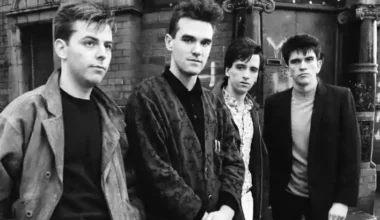The Beatles are often labeled as overrated, with critics arguing their music doesn’t deserve the immense praise it receives, and that the band’s legacy is too highly regarded.
While such a claim could hold weight if The Beatles were only judged by their music, their impact goes far beyond just songs.
The Beatles didn’t just change the soundscape; they also revolutionized the way British bands were perceived globally, especially in America.
Their influence opened the door for countless others and redefined cultural expectations.
Before The Beatles, British musicians had only achieved moderate success in the U.S., with acts like Cliff Richard and Billy J. Kramer making small waves but leaving no lasting imprint.
It seemed unlikely that UK artists would ever truly break through in the American market, but then The Beatles arrived and changed everything.
By the time The Beatles landed in the U.S., they were already well-established. Though they’d only had a few singles chart in America, their experience showed.
As Steve Van Zandt pointed out, “By the time they came to the U.S., they were halfway through their career. They had been going since ’57 and were gone in ’69. So by ’64 they were quite sophisticated and highly evolved.”
This meant that their music and live performances were polished and prepared for a broader audience.
The success of singles like “I Want To Hold Your Hand” was bolstered by their iconic live performance on The Ed Sullivan Show, which captivated American viewers and sparked widespread Beatlemania.
Their televised appearance became the turning point that opened the floodgates for British bands in the U.S.
“There was no real future for a British band before The Beatles appeared on The Ed Sullivan Show in February 1964.
That was the turning point, after which there was an avalanche,” said Andrew Loog Oldham, The Rolling Stones’ manager.
“It totally transformed the possibilities, and as usual, The Beatles were the frontrunners. In music, there is The Beatles, and then there is everybody else.”
Oldham’s statement, though bold, isn’t without debate. The Beatles undoubtedly led the British Invasion, with bands like The Dave Clark Five and Herman’s Hermits following in their wake.
These groups also made significant strides in the U.S., and some believe that their success was largely enabled by The Beatles’ groundbreaking arrival.
Oldham himself acknowledged the domino effect The Beatles caused, noting that The Rolling Stones only made their mark in America after bands like The Beatles, The Dave Clark Five, and Herman’s Hermits had paved the way.
“They were the pioneers,” he said. “If The Beatles ever looked over their shoulders, The Rolling Stones were not the first thing they saw – it was The Dave Clark Five.”
While The Rolling Stones have arguably become one of the most enduring British rock bands, selling out arenas for decades and maintaining their global influence, the question remains: Do they owe their success to The Beatles?
The first question is whether the British Invasion would have happened without The Beatles. Oldham mentions other successful British acts, like The Dave Clark Five and Herman’s Hermits, both of whom had hit records in America.
While these bands didn’t sustain the same level of success as The Beatles, they were still significant players in breaking into the U.S. market.
It’s plausible that another group could have ignited the British Invasion, even without John Lennon and Paul McCartney’s songwriting genius.
The second argument is whether The Rolling Stones would have thrived in the U.S. without The Beatles leading the charge.
Given that The Rolling Stones’ sound was distinct, focusing more on R&B and blues, with influences from American artists like Muddy Waters, they likely would have found an audience.
The American market had already shown an appetite for rock and R&B, meaning The Rolling Stones could have succeeded independently of the British Invasion.
It’s difficult to imagine the music landscape without The Beatles, given how profoundly they shaped the industry.
While the notion that The Rolling Stones owe their success to The Beatles holds some validity, it may oversimplify the unique path The Stones took. Suggesting that they are entirely indebted to the Fab Four seems overly harsh.







